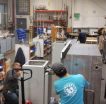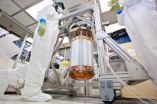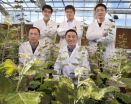(Press-News.org) A new study by a Wits University scientist has overturned a long-standing hypothesis about plant speciation (the formation of new and distinct species in the course of evolution), suggesting that agricultural crops could be more vulnerable to climate change than was previously thought.
Unlike humans and most other animals, plants can tolerate multiple copies of their genes – in fact some plants, called polyploids, can have more than 50 duplicates of their genomes in every cell. Scientists used to think that these extra genomes helped polyploids survive in new and extreme environments, like the tropics or the Arctic, promoting the establishment of new species.
However, when Dr Kelsey Glennon of the Wits School of Animal, Plant and Environmental Sciences and a team of international collaborators tested this long-standing hypothesis, they found that, more often than not, polyploids shared the same habitats as their close relatives with normal genome sizes.
"This means that environmental factors do not play a large role in the establishment of new plant species and that maybe other factors, like the ability to spread your seeds to new locations with similar habitats, are more important," said Glennon.
"This study has implications for agriculture and climate change because all of our important crops are polyploids and they might not be much better at adapting to changing climate than their wild relatives if they live in similar climates."
Glennon's study also provides an alternative explanation for why plants are so diverse in places like the Cape where the climate has been stable for hundreds of thousands of years. Although her study examined plant species from North America and Europe only, she is looking forward to testing her hypotheses using South African plants.
INFORMATION:
Glennon's paper has been published in Ecology Letters, a flagship journal for broad-scale ecology research.
For more information, contact Dr Kelsey Glennon at +27 79 560 1505 or kelsey.glennon@wits.ac.za. Images are available on request.
About Dr Kelsey Glennon
Dr Kelsey Glennon is a Carnegie Postdoctoral Fellow in Climate Change Research in the School of Animal, Plant and Environmental Sciences and the Global Change and Sustainability Research Institute at the University of the Witwatersrand, Johannesburg. She became interested in plant genetics while volunteering in the Hunter Lab at Salisbury University in her second year of college. She pursued a PhD at George Washington University in Washington, DC, studying plant hybridisation, its effects on species boundaries, and resulting conservation issues. Dr Glennon came to Wits University from a prestigious NSF Bioinformatics Fellowship at Syracuse University in New York. She is currently doing active field research on baobab trees in Limpopo Province and the medicinally important plant imphepho (Helichrysum odoratissimum).
Crop species may be more vulnerable to climate change than we thought
2014-02-20
ELSE PRESS RELEASES FROM THIS DATE:
Surprising culprit found in cell recycling defect
2014-02-20
To remain healthy, the body's cells must properly manage their waste recycling centers. Problems with these compartments, known as lysosomes, lead to a number of debilitating and sometimes lethal conditions.
Reporting in the Proceedings of the National Academy of Sciences (PNAS), researchers at Washington University School of Medicine in St. Louis have identified an unusual cause of the lysosomal storage disorder called mucolipidosis III, at least in a subset of patients. This rare disorder causes skeletal and heart abnormalities and can result in a shortened lifespan. ...
MD Anderson researcher uncovers some of the ancient mysteries of leprosy
2014-02-20
Research at The University of Texas MD Anderson Cancer Center is finally unearthing some of the ancient mysteries behind leprosy, also known as Hansen's disease, which has plagued mankind throughout history. The new research findings appear in the current edition of journal PLOS Neglected Tropical Diseases. According to this new hypothesis, the disease might be the oldest human-specific infection, with roots that likely stem back millions of years.
There are hundreds of thousands of new cases of leprosy worldwide each year, but the disease is rare in the United States, ...
Sustainable manufacturing system to better consider the human component
2014-02-20
CORVALLIS, Ore. – Engineers at Oregon State University have developed a new approach toward "sustainable manufacturing" that begins on the factory floor and tries to encompass the totality of manufacturing issues – including economic, environmental, and social impacts.
This approach, they say, builds on previous approaches that considered various facets of sustainability in a more individual manner. Past methods often worked backward from a finished product and rarely incorporated the complexity of human social concerns.
The findings have been published in the Journal ...
New calibration confirms LUX dark matter results
2014-02-20
PROVIDENCE, R.I. [Brown University] — A new high-accuracy calibration of the LUX (Large Underground Xenon) dark matter detector demonstrates the experiment's sensitivity to ultra-low energy events. The new analysis strongly confirms the result that low-mass dark matter particles were a no-show during the detector's initial run, which concluded last summer.
The first dark matter search results from LUX detector were announced last October. The detector proved to be exquisitely sensitive, but found no evidence of the dark matter particles during its first 90-day run, ruling ...
Better broccoli, enhanced anti-cancer benefits with longer shelf life
2014-02-20
URBANA, Ill. – While researching methods to increase the already well-recognized anti-cancer properties of broccoli, researchers at the University of Illinois also found a way to prolong the vegetable's shelf life.
And, according to the recently published study, the method is a natural and inexpensive way to produce broccoli that has even more health benefits and won't spoil so quickly on your refrigerator shelf.
Jack Juvik, a U of I crop sciences researcher, explained that the combined application of two compounds, both are natural products extracted from plants, increased ...
Smaller meals more times per day may curb obesity in cats
2014-02-20
URBANA, Ill. – Just as with people, feline obesity is most often linked to excessive food intake or not enough physical activity. Attempts to cut back on calories alone often result in failed weight loss or weight regain in both people and their pets.
So how do you encourage your cat to get more exercise?
Researchers from the University of Illinois interested in finding a method to maintain healthy body weight in cats, looked at a previously suggested claim that increased meal frequency could help to increase overall physical activity.
The idea is to feed cats the ...
Color vision problems become more common with age, reports Optometry and Vision Science
2014-02-20
Philadelphia, Pa. (February 20, 2014) - Abnormal color vision increases significantly with aging—affecting one-half or more of people in the oldest age groups, reports a study in Optometry and Vision Science, official journal of the American Academy of Optometry. The journal is published by Lippincott Williams & Wilkins, a part of Wolters Kluwer Health.
While few people younger than 70 have problems with color vision, the rate increases rapidly through later decades of life, according to the new research by Marilyn E. Schneck, PhD, and colleagues of The Smith-Kettlewell ...
Roots to shoots: Hormone transport in plants deciphered
2014-02-20
Plant growth is orchestrated by a spectrum of signals from hormones within a plant. A major group of plant hormones called cytokinins originate in the roots of plants, and their journey to growth areas on the stem and in leaves stimulates plant development. Though these phytohormones have been identified in the past, the molecular mechanism responsible for their transportation within plants was previously poorly understood.
Now, a new study from a research team led by biochemist Chang-Jun Liu at the U.S. Department of Energy's (DOE) Brookhaven National Laboratory identifies ...
New research shows the way a room is lit can affect the way you make decisions
2014-02-20
The next time you want to turn down the emotional intensity before making an important decision, you may want to dim the lights first.
A new study from the University of Toronto Scarborough shows that human emotion, whether positive or negative, is felt more intensely under bright light. Alison Jing Xu, assistant professor of management at UTSC and the Rotman School of Management, along with Aparna Labroo of Northwestern University, conducted a series of studies to examine the unusual paradox of lighting and human emotion.
"Other evidence shows that on sunny days people ...
Recurrent mouth and throat cancers less deadly when caused by virus, study shows
2014-02-20
People with late-stage cancer at the back of the mouth or throat that recurs after chemotherapy and radiation treatment are twice as likely to be alive two years later if their cancer is caused by the human papillomavirus (HPV), new research led by a Johns Hopkins scientist suggests.
Previous studies have found that people with so-called HPV-positive oropharyngeal cancers are more likely to survive than those whose cancers are related to smoking or whose origins are unknown.
The new study, scheduled to be presented Feb. 20 at the 2014 Multidisciplinary Head and Neck ...




